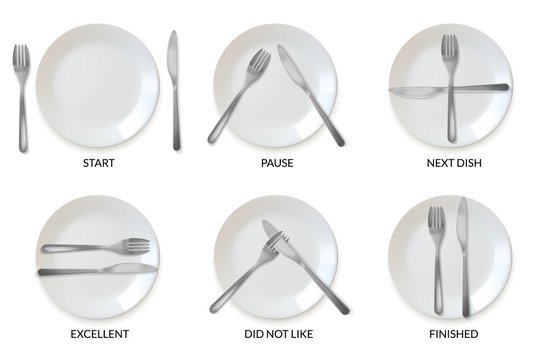
Dinning etiquette 's
Greetings and welcome to this vital but often neglected topic: table manners. In reality, dining etiquette is meant to make individuals enjoy dinner parties, special occasions, and other circumstances where other people are involved and should be taken into consideration. This is an area that causes unnecessary fear and anxiety in a lot of people.
About the way was given to make sure that everyone knew his responsibilities and what was expected of him during formal dinners where staff members were in charge of laying the table, cooking, serving, and cleaning up.
To enjoy yourself and other people’s company, it’s necessary to learn good manners, as it’s still true that bad manners and bad habits make other people uncomfortable.

Understanding civility and graciousness—the two underlying concepts of manners and etiquette—as well as the difficulties and significance of forming excellent manners as daily habits is necessary before discussing good and bad manners.
Civility :-
In social interactions and communication, civility is defined as a set of rules or behavior that prioritizes consideration, courtesy, and respect for other people. Key terms for civility include tolerance, self-control, empathy, courtesy, and respect.
Graciousness
Being gracious is exhibiting compassion, grace, and generosity of spirit in one’s words, deeds, and manner. Regardless of the situation, it is a quality that conveys true warmth, consideration, and thoughtfulness for people. Kindness and compassion, grace and poise, hospitality and generosity, thankfulness and appreciation, etc. are a few buzzwords.
Manners
Regarding manners, it is appreciating the value of social interactions like having dinner or an evening together.
How can one recognize good manners?
People with good manners approach interactions with others with a kind attitude. A key component of having good manners is being hospitable, kind, and gracious. Good manners include remembering to communicate with tact and treat others with dignity.

Etiquette
While learning others manners is about making them feel at ease and comfortable, etiquette refers to a set of guidelines for appropriate behavior in a variety of contexts, from formal letter writing to lavish weddings or informal dinners.

Some of the rules of dining etiquette in US includes:
- When asked to pass the salt or the pepper always pass them together.
- When you want to something at table, ask for it _ Don’t reach for it.
- When passing dishes, offer then to other people first before helping yourself.
- Do not help your self to food served family style by using a fork or spoon that has already been in your mouth.
- Do not use hands to eat food.
- Do not help yourself to food on another persons plate.
- Do not talk with your mouth full.

Enlisted top 10 dinning manner as follow :
1. Seating Arrangements:
The host usually determines the seating arrangements, but if you find yourself choosing your seat, remember that the guest of honor typically sits to the right of the host. When sitting down, do so gently without sliding or scooting your chair, and ensure that you leave ample space between yourself and others at the table.
2. Napkin Etiquette:
Upon sitting down, unfold your napkin and place it on your lap. If you need to excuse yourself from the table temporarily, loosely fold your napkin and place it to the left of your plate. When the meal is finished, leave your napkin unfolded and neatly placed to the left of your plate.
3. Using Utensils:
A general rule of thumb is to start from the outside and work your way in with utensils. If you’re unsure which utensil to use, observe the lead of your host or follow the flow of the meal from the outside in. Remember to hold utensils properly; knives with the blade facing inward and forks with the tines facing up.
4. Pace Yourself:
Avoid rushing through your meal, even if you’re famished. Pace yourself to match the speed of the other diners and engage in conversation between bites. Take small, manageable portions and avoid overloading your fork or spoon.
5. Conversational Etiquette:
Engage in polite conversation but be mindful not to dominate the discussion. Avoid controversial topics like politics or religion, and instead, focus on light, neutral subjects that everyone can contribute to comfortably. Practice active listening and show genuine interest in what others are saying.
6. Wine and Toasting:
If wine is being served, wait for the host or the person who ordered the wine to initiate the toast before taking a sip. Hold your glass by the stem to avoid warming the wine with your hand. When toasting, raise your glass slightly, make eye contact with the person you’re toasting, and keep your toast brief and sincere.
7. Handling Difficult Foods:
Encounter a dish you’re unfamiliar with? Approach it with curiosity and openness. If you’re unsure how to eat a particular food, observe others or discreetly ask your dining companions for guidance. Remember to chew with your mouth closed and avoid speaking with food in your mouth.
8. Thanking Your Host:
Express gratitude to your host before leaving the table. A simple “thank you for having me” or “I had a wonderful time” goes a long way in showing appreciation for their hospitality.
9. Paying the Bill:
If you’re the host, be discreet when settling the bill to avoid making others feel uncomfortable. If you’re a guest, offer to contribute or leave a tip if appropriate, but avoid insisting if your offer is declined.
10. Exiting Gracefully:
When the meal is over, rise from the table gently and thank your host once more. Offer to help clear the table or wash dishes if you’re dining in a casual setting.
Mastering the art of dining etiquette takes practice and attentiveness, but it’s a skill set that can enhance your social interactions and leave a positive impression on those around you. By observing these guidelines with sincerity and grace, you can navigate any dining situation with confidence and finesse, ensuring a pleasurable experience for yourself and your fellow diners.
“ Bad manners will always be frowned on and good manners admired,”
-Nicholas Clayton.
